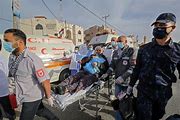In a collaborative effort to bolster maternal and child health services across Africa, the World Health Organization (WHO), in partnership with the United Nations Children’s Fund (UNICEF) and the United States Agency for International Development (USAID), recently spearheaded a groundbreaking capacity-building workshop. This initiative aimed to empower healthcare professionals, policymakers, and stakeholders from ten countries in Africa: Ethiopia, Ghana, Kenya, Malawi, Nigeria, South Sudan, Tanzania, Uganda, Zambia, and Zimbabwe.
As reported by “https://www.africahealthtimes.com”
>Africa Health Times
The workshop unfolded from 12 to 15 February 2024 in Nairobi, Kenya. It centered on enhancing these countries’ capabilities to effectively implement the Baby-Friendly Hospital Initiative (BFHI), recognized as a pivotal component of strategies promoting quality care for maternal and newborn health. The BFHI was established by WHO and UNICEF with the goal of safeguarding and nurturing breastfeeding practices and mother-baby bonding by ensuring that maternity facilities adhere to the Ten Steps to Successful Breastfeeding.
“The capacity-building workshop represents a significant milestone in our efforts to advance maternal and child health outcomes in Africa.”
This initiative holds immense importance as it significantly improves breastfeeding rates worldwide while fostering better child health outcomes. Early initiation of breastfeeding plays a vital role in reducing infant mortality rates—a critical factor in advancing global nutrition targets such as combating stunting and anaemia in women of reproductive age.
Despite its proven benefits, there is still room for improvement in implementing BFHI standards. Shockingly, only two out of 42 African countries have more than half of births occurring in Baby-friendly facilities. This concerning trend is exacerbated by dwindling breastfeeding rates globally due to aggressive marketing strategies promoting infant formula consumption over breastfeeding.
“Breastfeeding makes a world of difference to both mother and child.”
To address this pressing issue head-on, WHO alongside its partners convened in Kenya with a clear mission: expedite countries’ commitment towards adopting and institutionalizing the Ten Steps to Successful Breastfeeding within national care standards. Moreover,
“the focus was on enhancing access to skilled breastfeeding counseling through comprehensive approaches led by each country.”
Dr Abdourahmane Diallo—WHO representative from Kenya—emphasized how strengthening healthcare professionals’ capacity not only promotes breastfeeding but also lays down a solid foundation for improving newborn survival rates while curbing childhood morbidity and mortality.
During the workshop’s plenary sessions,
“policymakers shared insights on overcoming barriers”
and sustaining momentum surrounding BFHI implementation efforts across participating nations. Countries deepened their understanding of successful breastfeeding practices at health facilities offering maternity services—a crucial aspect integrated into their overall healthcare systems aimed at elevating service quality.
Christiane Rudert—Regional Advisor for UNICEF Eastern and Southern Africa—highlighted how such workshops equip healthcare practitioners with essential tools enabling them to provide crucial support tailored towards infants and mothers from vulnerable communities.
“From birth to 6 months of age… feeding infants nothing but breastmilk guarantees them uniquely adapted nutrient needs.”
Participants left the workshop equipped with action plans designed collaboratively during which they made bold commitments toward driving BFHI implementation at both national levels—and subnational tiers—with an emphasis on monitoring progress rigorously.This signifies an informed approach centered around ensuring accountability.
Representing Uganda during these discussions,
Olivia Timpo from Ghana expressed intentions geared towards embracing new methodologies while verifying competencies among health workers regarding handling sustained breastfeeding practices.Their plan involves engaging stakeholders actively while employing facilitation processes that inspire quality enhancement along with monitoring vital breastfeeding indicators.
Through dedicated workshops like these,WHO AFRO reiterates its unwavering commitment towards providing continuous support,technical guidance,and resources needed for seamless execution of BFHI principles throughout the region.
**Attribution**:
Article sourced from [Africa Health Times](https://www.africahealthtimes.com).









Leave feedback about this